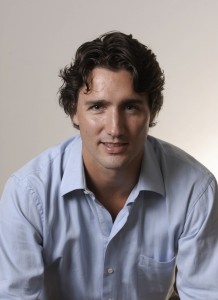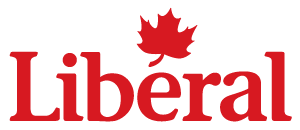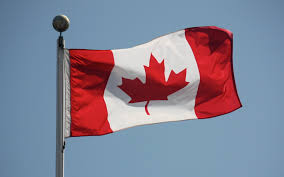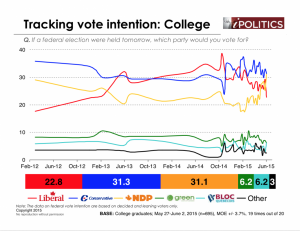
Justin Trudeau
Justin Trudeau’s Liberal Party won a majority government. Former Prime Minister Stephen Harper has stepped down as Conservative party leader. As of this writing, Thomas Mulcair has not stepped down as NDP leader.
The election started with the NDP in the lead, primarily due to the Liberal Party having voted for the police state bill C51. The NDP ran to the center, the Liberals ran (somewhat) to the left. NDP’s lead narrowed, then they were neck and neck until the Conservative party and Bloc Quebecois used the Niqab as a wedge issue. You can read a summary of the campaign here.
So what does this mean going forward?
A great deal will depend on how Trudeau rules. (A majority Canadian PM is essentially an elected dictator).
Trudeau has promised to repeal C51 and reintroduce a similar bill, minus the worst bits of C51. Note that Trudeau has repeatedly stated he voted for C51 as a matter of principle, so some of the nasty will remain.
Pipelines are a go. TPP is a go (though the NDP was not great on either of those issues, they were better than the Liberals).
National Pharmacare and Daycare will not happen.
Certain regressive tax changes, like income splitting, are gone. Expect another tax cut for the “middle class,” which it doesn’t particularly need.
Expect the muzzling of scientists to end, and the long-form census form to return. (Conservatives got rid of the longer census form and made the census non-mandatory, turning its data, essentially, to meaningless crap.)
Moving away from the First Past the Post-electoral system: The NDP and Liberals had both said they intended to do something along these lines. But with a Liberal majority government in power, this is very much in question. I will be pleasantly surprised if Trudeau doesn’t bury this in a committee.
The Economy
The brutal truth about the Canadian economy is that it is unlikely to recover significantly, though the recession will end.
I’ve written about the Canadian mixed economy in the past, but the bottom line is that Harper doubled down on resource extraction–especially oil. Manufacturing was gutted during the period of high oil prices and a strong Canadian dollar and will not recover naturally during a weak dollar period. This is because those who took advantage the last time were burned so badly most of them went out of business.
Canada’s housing bubble is significantly worse than the US housing bubble in 2007. This bubble is government guaranteed.
So, at this point, Canada is a resource extraction economy with artificially high asset prices. It is a petro-state.
Trudeau is onside with this. Mulcair repeatedly talked about the mixed economy and how to return to it, and was a staunch and principled environmentalist. Trudeau has pandered repeatedly to the oil sector.
Given this, there are only two questions about the Canadian economy that matter:
- Will the housing bubble endure?
- Will oil prices rise, preferably above about $80US a barrel, which is the break-even price for much of the oil sands?
If you think the housing bubble will burst, you expect a financial crisis. If you think the answer to number two is no, then you think that the Canadian economy will not significantly improve under Trudeau.
Trudeau’s economic performance, in other words, is linked almost entirely to how China’s economy performs and the world price of oil–things over which he has no control.
The Next Election
The economy may get a lot better, but that doesn’t mean it may not bumble along sufficiently well for the Liberals to be re-elected. Contrary to Democratic party talking points, Obama never fixed the US economy. The percentage of people employed in the US never recovered and wages stagnated, but Obama was re-elected (the Democrats didn’t do as well in the House, but the House in America is gerrymandered).
Still, the NDP and Conservatives will likely have an opening in the next election. Whether they will be able to capitalize on it is unclear and, again, much depends on Trudeau’s performance. Right now, he is a blank slate upon whom many hopes have been written. But in four years, he will have a track record.
I don’t know if Mulcair will stay on as NDP leader. He was a strong and effective opposition leader, but he was neither on the campaign trail, and must shoulder responsibility for turning a first place start into a third place finish. He has lost all the gains made by the previous NDP leader, Jack Layton. (I believe Layton would have won this election. The cost of his death rises and rises.)
As for the Conservatives, expect one of the Ford brothers to run, among others. It will be a zoo. But the Conservatives held their prairie base and a good chunk of Ontario and BC. They were not wiped out, they just lost. They will remain a viable threat–especially if the electoral system remains the same.
Justin Trudeau is going to feel good, for a while, compared to Harper. He will be better. He will repeal some of Harper’s worst policies. He will also not be an offensive creep, and that matters.
But he is, at the end of the day, a believer in the neo-liberal consensus. He will run a kinder neoliberalism, but it will still be neoliberalism. He is not particularly committed to civil liberties, he had no principled opposition to Harper’s worst excesses (that was Mulcair), and there is no particular reason to believe he will make any sort of radical break from Conservative policies; he voted for a great many of them.
The bottom line is this: Justin showed his character when he supported C51. Mulcair showed his character when he went hard against it, even as polls showed a majority of Canadians were in favor of it (they later changed their mind, but he did what he did when it was unpopular).
I cannot find any great confidence in Trudeau, either as an ethical man, or as an economic leader.
Finally, despite the spin in the global and domestic press, this election is no great repudiation of Harper, or a collapse of the Conservative party, which maintained most of its voters. There has been no collapse, like what happened to the Progressive Conservatives after Mulroney. After nine years in power, it is normal for a party to lose power, and majority governments are the historical norm in Canada. This is a status quo flip between Canada’s two ruling parties.
Harper changed the nature of Canada’s government and economy, and created a unified Conservative Party. Trudeau will not undo most of Harper’s fundamental changes. Harper will go down as an important Prime Minister.
Stay tuned.
If you enjoyed this article, and want me to write more, please DONATE or SUBSCRIBE.




